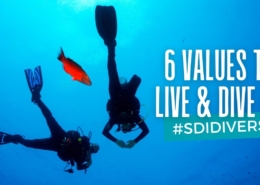How Shark Diving Can Help Save Sharks
by: Sean M. Cleary
Shark diving is considered one of the fastest-growing animal encounter experiences. Tourists and locals alike travel to meet sharks face-to-face and for many, this is an unmissable, once-in-a-lifetime experience. Unfortunately, it may become a rare encounter in more ways than one.
There is a decline of shark populations around the world, largely due to the rising demand in Asia for shark-fin, a costly delicacy. Shark finning is the act of cutting off a shark’s fins, then throwing the shark’s body back in the water. The shark is then eaten alive by other fish…or it drowns. All for a bowl of fin soup.
Shark diving can perform an important ecological service as it shows the reality of a misunderstood animal suffering from modern industrial fishing. Consumers need to know that they can help the environments that are home to our fierce friends.
An ethical animal attraction you can feel good about
For sharks to be protected, they need to be worth more alive, in the ocean, than dead. Consequently, authorities will do more to protect them. Ethical and responsible shark diving is a great tool for achieving this. It educates people about the importance of sharks while helping remove fear.
According to research, shark tourism is worth over $314 million per year and this tourism is expected to generate over $780 million worldwide within the next 20 years. Shark diving is a good way of promoting their protection and conservation and can be enjoyed with a variety of shark species at amazing destinations.
"The only way many people come to know sharks is through movies. But when you're in the water looking at these animals calmly swimming around, you go through a transformation. You understand sharks, see what they really are. Chances are you'll walk off a shark diving tour as a proponent for sharks," says Sean M. Cleary, an avid Florida diver who has obtained his scuba certification before becoming a lawyer.
Divers are blessed with the chance to see what only a few others see; the heart of the underwater world. At every shark dive, you can encounter a wide variety of mysterious depths and this beautiful, endangered animal.
Up to 73M sharks are killed each year by shark finning. It’s illegal in most countries but, due to the lack of funds to patrol the waters, enforcement is sparse in many nations. Therefore, promoting shark tourism and encouraging more adventurers to swim or dive with sharks is one of the most important ways to save them.
The funds generated by diving with sharks can then be used to patrol the waters and keep the shark finners out.
Shark diving in Florida
When thinking of shark diving in the US, most people think of great white shark cage diving in California. But the variety of sharks that can be seen in Florida is among the best on the planet. If you consider the number of shark-human interactions, you’ll notice the state that wins is Florida.
Off the coast of California, tourists can see great white sharks and even the odd blue. Although there is only a small chance to see a great white shark in Florida, the list of shark species that can be admired is huge. Among others, these include the hammerhead shark, scalloped hammerhead shark, bull shark, lemon shark, blacktip shark and tiger shark.
With that selection comes a variety of options for shark interaction, you can:
- Swim with sharks. On some tours, you will be swimming with sharks.
- Snorkel with sharks. When you add a snorkel you can get more personal with them.
- Scuba dive with sharks. This is a common scenario in which, while you dive, a divemaster attracts the sharks with bait.
- Cage dive with sharks. This type of diving is an option as well.
Almost everyone can go shark diving in Florida, whether they’re certified or not. If you go shark spotting from a boat you don’t even have to know how to swim.
The pre-dive safety check
Before diving, there are a great number of standard safety procedures that have to be followed. There must be a dive protocol, and an instructional period before all the divers enter the water. There should be a buddy system that’s followed. There should be an emergency recall signal. All of these need to be discussed before anyone enters the water.
Whether you have just started scuba diving or are an experienced deep-sea diver, there is always something new to learn about diving. Take full advantage of every opportunity to learn and bring safety, awareness and positive attitudes to recreational scuba diving operations.
Shark diving is, in many ways, about education and respect. As stated, there are many benefits to enjoy from giving the public access to sharks. However, this means always fostering a spirit of learning and symbiosis and having the necessary experience and permits.









השאירו תגובה
רוצה להצטרף לדיון?תרגישו חופשי לתרום!